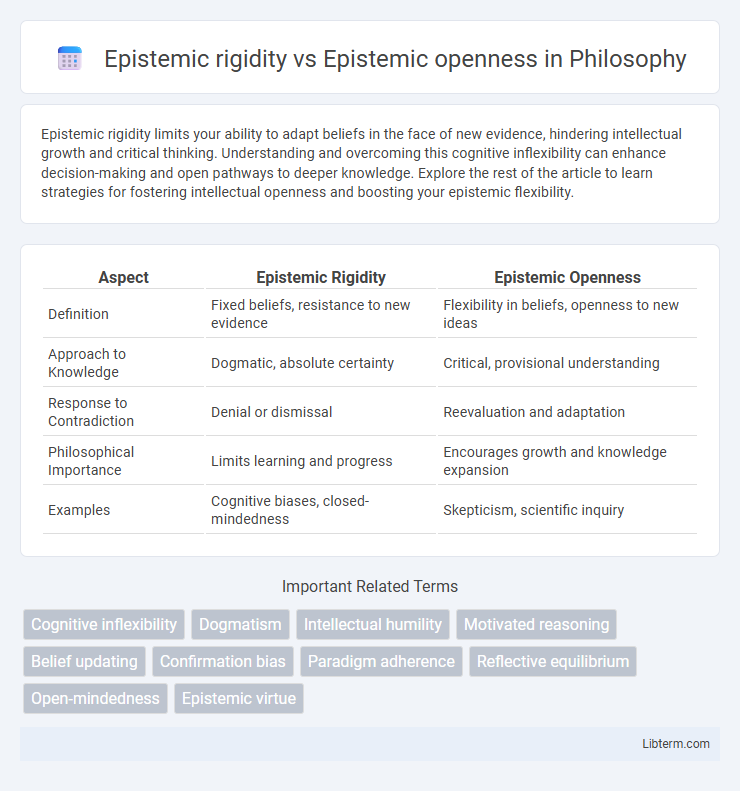Epistemic rigidity limits your ability to adapt beliefs in the face of new evidence, hindering intellectual growth and critical thinking. Understanding and overcoming this cognitive inflexibility can enhance decision-making and open pathways to deeper knowledge. Explore the rest of the article to learn strategies for fostering intellectual openness and boosting your epistemic flexibility.
Table of Comparison
| Aspect | Epistemic Rigidity | Epistemic Openness |
|---|---|---|
| Definition | Fixed beliefs, resistance to new evidence | Flexibility in beliefs, openness to new ideas |
| Approach to Knowledge | Dogmatic, absolute certainty | Critical, provisional understanding |
| Response to Contradiction | Denial or dismissal | Reevaluation and adaptation |
| Philosophical Importance | Limits learning and progress | Encourages growth and knowledge expansion |
| Examples | Cognitive biases, closed-mindedness | Skepticism, scientific inquiry |
Defining Epistemic Rigidity and Openness
Epistemic rigidity refers to a cognitive stance characterized by resistance to revising beliefs despite new evidence, often manifesting as dogmatism or closed-mindedness. In contrast, epistemic openness embodies a willingness to consider alternative perspectives and update beliefs based on reliable information and critical reflection. These contrasting attitudes significantly influence decision-making, learning processes, and intellectual humility within various epistemic communities.
Historical Perspectives on Knowledge and Belief
Historical perspectives reveal that epistemic rigidity often stems from dogmatic adherence to established knowledge systems like medieval scholasticism, where belief was anchored in authoritative texts and tradition. In contrast, epistemic openness emerges prominently in the Enlightenment era, emphasizing critical inquiry, empirical evidence, and the willingness to revise beliefs based on new data. These contrasting approaches underscore the evolution of knowledge acquisition from fixed doctrines to dynamic, evidence-based understanding.
Psychological Roots of Epistemic Attitudes
Epistemic rigidity stems from deep psychological needs for certainty, cognitive closure, and fear of ambiguity, often linked to anxiety and a threat-avoidance mindset. In contrast, epistemic openness is associated with intellectual humility, curiosity, and a tolerance for uncertainty, fostering flexible thinking and adaptive learning. These attitudes are influenced by underlying cognitive styles, emotional regulation, and social identity factors that shape how individuals process information and update beliefs.
Cognitive Biases and Epistemic Rigidity
Epistemic rigidity refers to the inflexible adherence to established beliefs, often reinforced by cognitive biases such as confirmation bias and belief perseverance, which filter information to support existing viewpoints. This rigidity limits critical thinking and engagement with alternative perspectives, undermining intellectual humility and adaptive learning. Recognizing and mitigating these cognitive biases is crucial for fostering epistemic openness, enabling individuals to revise beliefs based on new evidence and improve knowledge acquisition.
The Benefits of Epistemic Openness
Epistemic openness enhances intellectual growth by fostering a willingness to consider diverse perspectives and revise beliefs based on new evidence. This cognitive flexibility improves decision-making, promotes critical thinking, and encourages continuous learning. Embracing epistemic openness also supports collaborative problem-solving and reduces cognitive biases that arise from rigid thinking.
Sociocultural Factors Influencing Epistemic Stance
Sociocultural factors significantly shape epistemic rigidity and openness by influencing individuals' exposure to diverse perspectives and cultural narratives. Communities with rigid epistemic stances often emphasize tradition, conformity, and collective identity, limiting the acceptance of alternative viewpoints. Conversely, environments promoting epistemic openness encourage critical inquiry, dialogue across differences, and adaptability to evolving knowledge, fostering greater cognitive flexibility and intercultural understanding.
Epistemic Approaches in Scientific Inquiry
Epistemic rigidity in scientific inquiry denotes a strict adherence to established theories and resistant attitudes towards alternative hypotheses, often limiting the evolution of knowledge. Epistemic openness embraces flexibility, encouraging critical evaluation, interdisciplinary integration, and adaptive methodologies that foster innovation and robust understanding. Balancing these epistemic approaches enhances the reliability, reproducibility, and progressive nature of scientific research processes.
Navigating Uncertainty: Flexibility vs. Certainty
Epistemic rigidity limits the ability to adapt beliefs, fostering a preference for certainty even amidst uncertain or complex information, which can hinder effective decision-making. Epistemic openness supports cognitive flexibility, encouraging the revision of beliefs and acceptance of new evidence to better navigate uncertainty and complexity. Balancing flexibility with sufficient certainty enables more accurate understanding and resilient responses in ambiguous or rapidly changing environments.
The Role of Education in Shaping Epistemic Views
Education profoundly influences epistemic views by cultivating either rigidity or openness in knowledge acquisition. Curricula emphasizing critical thinking, reflective inquiry, and diverse perspectives promote epistemic openness, enabling learners to adapt and revise beliefs based on evidence. Conversely, educational environments that prioritize rote memorization and authoritative knowledge contribute to epistemic rigidity, limiting intellectual flexibility and resistance to new information.
Towards a Balance: Fostering Epistemic Humility
Epistemic rigidity restricts cognitive flexibility by clinging to fixed beliefs, while epistemic openness encourages the consideration of diverse perspectives and evidence. Striving for a balance involves cultivating epistemic humility, which acknowledges the limitations of one's knowledge and remains receptive to new information. This approach enhances critical thinking and promotes constructive dialogue, fostering a more adaptive and nuanced understanding of complex issues.
Epistemic rigidity Infographic

 libterm.com
libterm.com